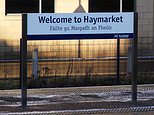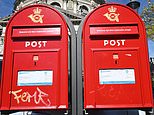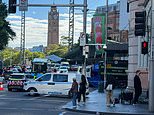
LIVING away from the old country can do strange things to the Scottish native. It turned the actor Alan Cumming into a global ambassador for fairy tales about the place that isn’t his home any more.
Cop the laddie fae Aberfeldy swathed in the most garish of tartans at the Emmys in LA last week after being nominated for hosting the American version of
Traitors. During the show, he repeatedly peddled the fiction to stateside viewers that the whole thing was set in his Highland castle.
He hammed up some preposterous Scottish baronial accent which went straight to my stomach.
His wardrobe was a shortbread tin caricature on acid. Two gongs bagged for this phoniness.
Glasgow-born broadcaster Andrew Marr branded spread of Gaelic signs ‘ridiculous’
Take the late Sean Connery, ‘Scotland Forever’ tattooed on his arm since his teens. The flipside to his decades as the most famous Scottish nationalist on the planet was his penchant for spending forever in homes in the Bahamas and Marbella.
The jibe that the 007 star would do anything for his country except live there was harsh but fair. There was not properly any ‘us’ in his cries for independence. It was independence for ‘them’ that he sought. Live with the consequences? I’m fine here by the pool, thanks.
But time away from the place needn’t necessarily muddle the wandering native’s understanding of what is really going on here. Sometimes the view from the outside looking in is sharper and more penetrating than the self-diagnoses we stay-at-home Scots attempt.
Sometimes the nail is hit on the head by a son or daughter of these shores whose absence from them has brought wisdom rather than romantic piffle about a place that never truly existed.
The man holding the hammer this week was Glasgow- born journalist Andrew Marr who has written extensively on the history of the British Isles. Significantly perhaps, the London-based broadcaster made his remarks from the relatively safe distance of Liverpool.
Why, he wondered, was Scotland awash with Gaelic signs when it hasn’t been widely spoken in much of it for centuries, if at all? ‘It’s ridiculous,’ he said.
What is with the decidedly un-user-friendly ‘Margadh an Fheòir’ sign which greets visitors to Haymarket station in Edinburgh?
Literally it means ‘market of hay’. Is the idea that every second Edinburgher already knows this and regularly refers to the station as such? Or are we fictionalising our association with a language almost none of us speak to impress those who don’t know any better?
Emblazoned
Mr Marr might equally have referred to the emergency vehicles seen whizzing around towns such as Cumbernauld and Glenrothes emblazoned with the word ‘poileas’ or ‘ambaileans’.
Is this for the benefit of the good people of these settlements who do not so readily recognise the words ‘police’ and ‘ambulance’?
Sometimes the Gaelic words on these vehicles appear in reverse writing. It’s presumably so that motorists can grasp with a glance in their rear-view mirror that the ‘poileas’ are in pursuit and to clear out of the way.
A couple of years before Police Scotland announced they didn’t have the resources to investigate every minor crime, and wouldn’t do it any more, they launched their Gaelic Language Plan – or Plana Gàidhlig if you prefer – and outlined the resources they would be throwing into it.
This included an audit of employees who understand Gaelic. An inventory would be compiled of all existing Gaelic and bilingual materials, including publications, stationery and online content.
The sign at Haymarket Station complete with a Gaelic translation
There would also be an assessment of internal and external signs to ensure ‘equal respect’ was accorded to Gaelic. Henceforth, all high-profile press releases would be translated into the language too.
You may surmise one of two things: either that the police were heavily leaned on by the Scottish Government, which has been at pains to embed confected Scottish culture into the nation throughout its 17 years of power – or that men like Andrew Marr and me simply have it in for Gaelic.
Let me address the second conclusion first. I’m enchanted by the fact Gaelic is still spoken regularly by 58,000 of us – or 1.1 per cent of our population – every one of whom, incidentally, is also fluent in English.
I want the language to survive. Long before the SNP came to power there were extensive measures to ensure this happened. The Gaelic Television Fund, for example, was established in 1992. It brought jobs and high-quality programming in Gaelic to the areas in the West of Scotland and the Hebrides where the language was most spoken.
It served the tongue and its speakers. What it didn’t do was pretend the 99 per cent of Scots who don’t speak it were something they were not.
‘The Scots are made up of many different peoples historically,’ said Mr Marr at an event at the Labour conference. ‘I think we should let languages rest and prosper where they come from.’
Sounds to me like he and I are on the same page.
Which just leaves us with the ‘wha’s like us Scots, eh?’ guff that the SNP government has been determined to ram down our throats.
They pretend that we are a nation of not just two languages, but three. Don’t forget Scots. Recent plans include the conceit that some teachers should deliver lessons only in Scots to help ‘embed’ the language in classrooms.
Excuse me, but if it isn’t embedded there already, what is the sense of filling children’s heads with it?
The sense is in grafting identity – or what Mr Marr might describe as Scottish ‘exceptionalism’ – onto young people before they are old enough to figure out who they really are.
In Liverpool, the broadcaster fumed at ‘the Scottish Nationalist view that if you’re Scottish, you’re a better person; because you’re Scottish, you’re more innately liberal; because you’re Scottish, you’re more progressive’.
Propaganda
The truth is because you’re Scottish, the facts will be misrepresented. You will be persuaded by those with no grounding in history that Scotland was colonised by the English when the truth is that, acting together, the two nations colonised much of the world.
You will find propaganda masquerading as educational material – such as Education Scotland’s 27-page The Road to the Scottish Parliament, which baldly informed children that ‘for 800 years the Scots have been struggling against English oppression’.
And you will discover at length, possibly years from now, that nationalism doesn’t make you a better person. The movement is not exactly noted for its ability to see the good in people, whatever their world view.
Rather it is consuming; it is intolerant; it narrows vision and clouds the lens with a fug of grievance and bitterness. No, while I like and admire many nationalists, they are dear people in spite of, not because of, their independence dream.
Mr Marr, of course, is not resident here. Broadcasters who are would be too terrified to call out what is obvious to many of us.
Do you suppose that fear is driven by the nationalists being such great guys?
j.brocklebank@dailymail.co.uk.






